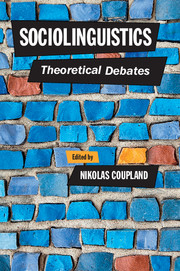Book contents
- Frontmatter
- Contents
- List of contributors
- Preface and acknowledgements
- 1 Introduction: Sociolinguistic theory and the practice of sociolinguistics
- Part I Theorising social meaning
- Part II Language, markets and materiality
- Part III Sociolinguistics, place and mobility
- Part IV Power, mediation and critical sociolinguistics
- Part V Sociolinguistics, contexts and impact
- 15 Are there zombies in language policy? Theoretical interventions and the continued vitality of (apparently) defunct concepts
- 16 Quantitative sociolinguistics and sign languages: Implications for sociolinguistic theory
- 17 Theorising language in sociolinguistics and the law: (How) can sociolinguistics have an impact on inequality in the criminal justice process?
- Part VI The evolution of sociolinguistic theory
- Index
- References
15 - Are there zombies in language policy? Theoretical interventions and the continued vitality of (apparently) defunct concepts
from Part V - Sociolinguistics, contexts and impact
Published online by Cambridge University Press: 05 June 2016
- Frontmatter
- Contents
- List of contributors
- Preface and acknowledgements
- 1 Introduction: Sociolinguistic theory and the practice of sociolinguistics
- Part I Theorising social meaning
- Part II Language, markets and materiality
- Part III Sociolinguistics, place and mobility
- Part IV Power, mediation and critical sociolinguistics
- Part V Sociolinguistics, contexts and impact
- 15 Are there zombies in language policy? Theoretical interventions and the continued vitality of (apparently) defunct concepts
- 16 Quantitative sociolinguistics and sign languages: Implications for sociolinguistic theory
- 17 Theorising language in sociolinguistics and the law: (How) can sociolinguistics have an impact on inequality in the criminal justice process?
- Part VI The evolution of sociolinguistic theory
- Index
- References
Summary
Introduction
The conditions of late modernity have led to calls for the reevaluation of the theoretical value of concepts generally developed in connection with modernist perspectives on language and society. Beck (Slater and Ritzer 2001: 262) describes as ‘zombie categories’ those concepts that are of questionable relevance:
I think we are living in a society, in a world, where our basic sociological concepts are becoming what I call ‘zombie categories’. Zombie categories are ‘living dead’ categories which govern our thinking but are not really able to capture the contemporary milieu. In this situation I don't think it's very helpful only to criticize normal sociology, and to deconstruct it. What we really need is to redefine, reconstruct, restructure our concepts and our view of society.
The most influential zombie categories for Beck are those connected with nationalism, such as the nation-state and the national language (Škabraha 2005; Beck 2011), and he sees a need to move away from categories that are ‘nation-state centred’ to those that are more ‘non-nation-state centred’ (Slater and Ritzer 2001: 262–263). In a somewhat similar vein, Heller (2008: 513) points out that even though ‘nation-states have scarcely disappeared as relevant actors and constraints on action … [i]t is increasingly difficult for them to impose fictive (linguistic, cultural) homogeneity within their boundaries’, and she calls for a ‘critical ethnographic sociolinguistics’ (2011) that understands the various processes by which language, community and identity, among other concepts, come to constructed as ‘regimes of truth’ (Heller 2011: 6, citing Foucault 1984).
It is important to note, however, that zombies may also be found beyond the nation-state (Beck 2002: 24). This is worth bearing in mind because the nation-state is by no means the only domain where language policy operates. As Spolsky (2009) points out, a number of other domains also come within the purview of language policy, such as the family, religion, the workplace, the military, the media, schools, and various international organizations, including NGOs. The expansion of the scope of language policy involves more than just the inclusion of other domains, however. The very idea of what we might mean by language policy has to also be understood in much more inclusive terms than it used to be.
- Type
- Chapter
- Information
- SociolinguisticsTheoretical Debates, pp. 331 - 348Publisher: Cambridge University PressPrint publication year: 2016
References
- 12
- Cited by



